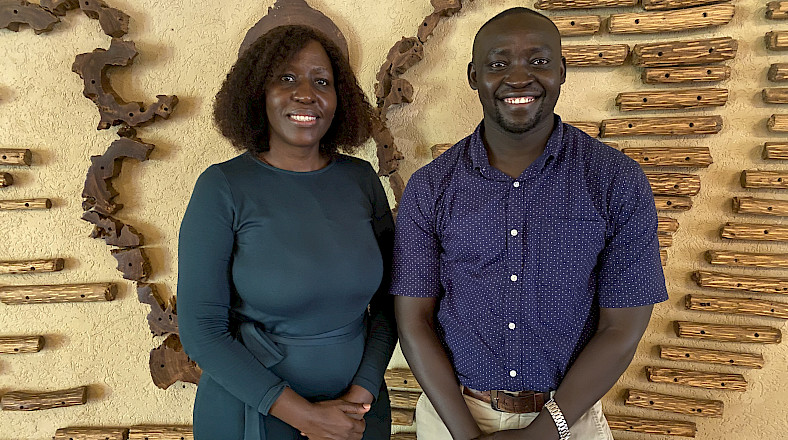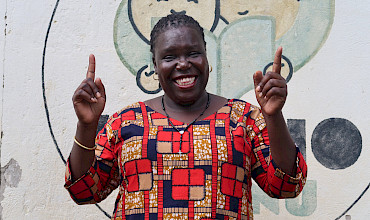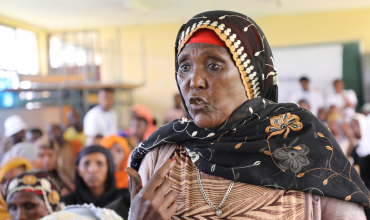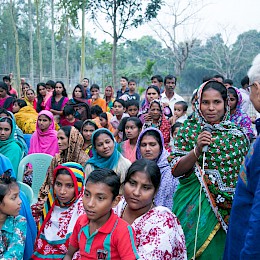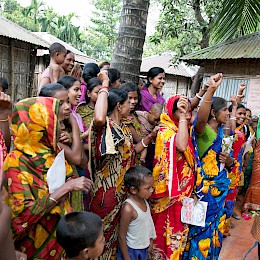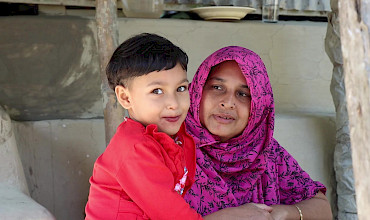
To commemorate the 16 Days of Activism Against Gender-Based Violence, Nixon Ochatre, the founder of Amani Initiative and chairperson for the Movement for Community-Led Development Uganda Chapter, invites Hellena Kasujja, the Executive Director of Community Integrated Development Initiative (CIDI), for a conversation. The purpose is to explore strategies for addressing gender-based violence (GBV), especially within the framework of the Right2Grow programme. They discuss how in Uganda, women’s roles in water, sanitation and hygiene (WASH) and nutrition may expose them to multiple forms of violence and reflect on the approaches their organisations have adopted to combat violence against women. Yet, before delving deeper into this discussion, it is imperative to address a fundamental question — why is it so crucial to understand how gender inequalities impact women and girls in the domains of WASH and nutrition?
Women at the heart
Women bear a disproportionate burden in the face of hunger, with 60% of chronically hungry individuals being women and girls. Moreover, inadequate nutrition for women and their children is the underlying cause of 3.5 million deaths around the world. Gender inequality is documented to contribute to inadequate nutrition and food insecurity among women and children; as in many contexts women have limited or no power to make key decisions on how food and other resources are distributed to household members. Moreover, micronutrient deficiencies disproportionally affect women and girls. In Uganda for example, the Demographic Health Survey of 2016 indicated that a third (32%) of women between 15-49 were anaemic compared to 16% of men.
Over the years, several programmes and projects in Uganda have aimed to address household gender inequalities in order to improve livelihoods and nutrition; however, their impact has not been fully realised. Coupled with climate change, gender inequalities are likely to exacerbate the already fragile food, nutrition and WASH situations in many communities in Uganda. The profound impact of gender inequalities on nutrition and WASH outcomes cannot be underestimated, given women’s central role in providing proper nutrition and collecting water for their families.
To delve deeper into this issue, the Right2Grow programme in Uganda initiated a locally-led research study through which they explored how gender dynamics influence the access and utilisation of WASH and nutrition services. The research brought together a local researcher, a local advocacy expert and a community knowledge holder – together called the ‘’Trio Fantastico’’ - who ensured the communities are in the centre of the research and engaged at all stages of the project.
Shouldering responsibilities in nutrition and WASH
Both Nixon and Hellena played pivotal roles in the research, with Nixon assuming the position of a community knowledge holder and Hellena contributing as a local advocacy expert. The study found that gendered assumptions are common in the realms of nutrition and WASH. Women were seen to be primarily responsible for sourcing, cooking and providing nutritious meals for their family members, while also shouldering the responsibility of collecting water and ensuring proper sanitation and hygiene practices within the household. Yet, decision-making power was often relegated to men, even in matters they had minimal involvement in.
In places with limited access, the roles that women play in WASH and nutrition expose them to injustices at both household and community levels, with the unequal impacts of climate change emerging as a particular concern. Participants noted that the low crop yields resulting from climate change proved disastrous for the dynamics between men and women, exacerbating gender-based violence. In some instances, the consequences of climate change were wrongly attributed solely to women, framing it as their failure to adapt to the challenging circumstances. Additionally, water scarcity, intensified by drought, forces women and children to walk long distances to secure water, exposing them to the risk of gender-based violence, alongside hunger, thirst and physical exhaustion.
Disturbingly, Hellena explains that deeply ingrained social norms regarding violence are so pervasive that even many women consider them acceptable.
Many women who have been subjected to gender-based violence have reached a stage in which they are normalising the violence, it has become a way of life. They have grown up with it.
Beyond the binary
Furthermore, Hellena underscores a critical dimension of the impact of gender-based violence that extends beyond the traditional roles of perpetrator and survivor. As it may also shape the well-being and future behaviour of children who are (indirectly) exposed to violence. This becomes crucial in the domain of nutrition, as research indicates that a maternal caregiver's experience of intimate partner violence may negatively affect breastfeeding practices and is also linked to low birthweight, stunting and severe malnutrition in her children. Furthermore, the psychological impact on children who witness violence should not be underestimated. Hellena: ‘’The children often become invisible. Yet, those who never heal may also become abusers themselves." This observation highlights the far-reaching consequences of unaddressed trauma, suggesting that when individuals are unable to cope with the psychological effects of witnessing violence, there is a risk of perpetuating a cycle of violence through generations.
Communities at the centre
In better understanding and addressing the socio-cultural ideas and norms around gender, the role of community engagement is critical. According to Nixon, it’s important to leverage existing community structures when working on norms change. ‘’We have to work with the community gatekeepers that are respected and trusted by the community, and work with them as agents of change. At Amani, we therefore work with model households who have adapted gender sensitive food, nutrition and WASH practices. During community dialogues they promote equal and positive gender norms and thereby promote peer to peer community-level learning.’’
Hellena agrees that working on norms change is very impactful, yet also points to the importance of interventions around economic empowerment. ‘’In addition to norms change, I want to emphasise that economic empowerment can really be a gamechanger. It can provide a woman with the means and the resilience to leave an abusive relationship and increase her autonomy and decision-making power.’’
Engaging men and boys
Both Hellena and Nixon however, are careful not to overlook the experiences of men and boys in discussions about gender-based violence. Both have witnessed the detrimental impact of gender stereotypes on men's self-perception and self-worth. Hellena for example, has come across cases where men’s inability to provide for their families has increased their risk of experiencing violence. It is therefore important to encourage men to understand their own wellbeing in different ways, as men too often neglect warning signs and indicators of their own mental and physical wellbeing.
Changing ingrained behaviour and traditions, especially in patriarchal systems, to prevent gender-based violence against both genders is not an easy challenge. Reflecting on the findings of the locally-led research, Nixon emphasises that men who have taken on responsibilities traditionally designated for women, have encountered resistance. They sometimes get laughed at by their peers and are called ‘’less of a man’’. Like one participant from the locally-led research put it: ‘’’Like recently, I put out household utensils and started washing them, people were passing by me and I couldn’t tell what my fellow men were thinking. They were saying that the woman finished me (being under a spell), which isn’t the case’’.
Long-term sustainable change
In order to achieve long-term, sustainable change, community-level interventions therefore need to be accompanied with programming that centres societal-level change. ‘’We need to understand the ecosystem surrounding a survivor in order to address the violence, and move away from an approach that is solely focused on the individual'', says Hellena. Nixon adds: ‘’I agree. The empowerment of women alone is not working, we must understand her background and consider household and broader societal structures, they have to be part of the change process too. Hence, adopting a whole systems approach to eliminate gender-based violence is needed.”
Back to overview